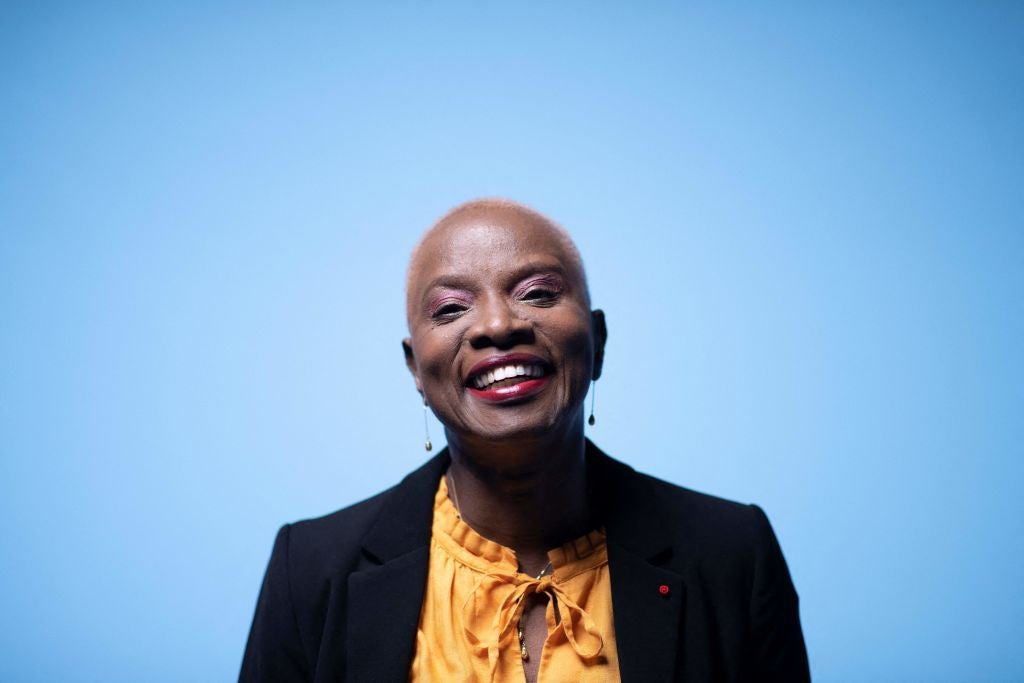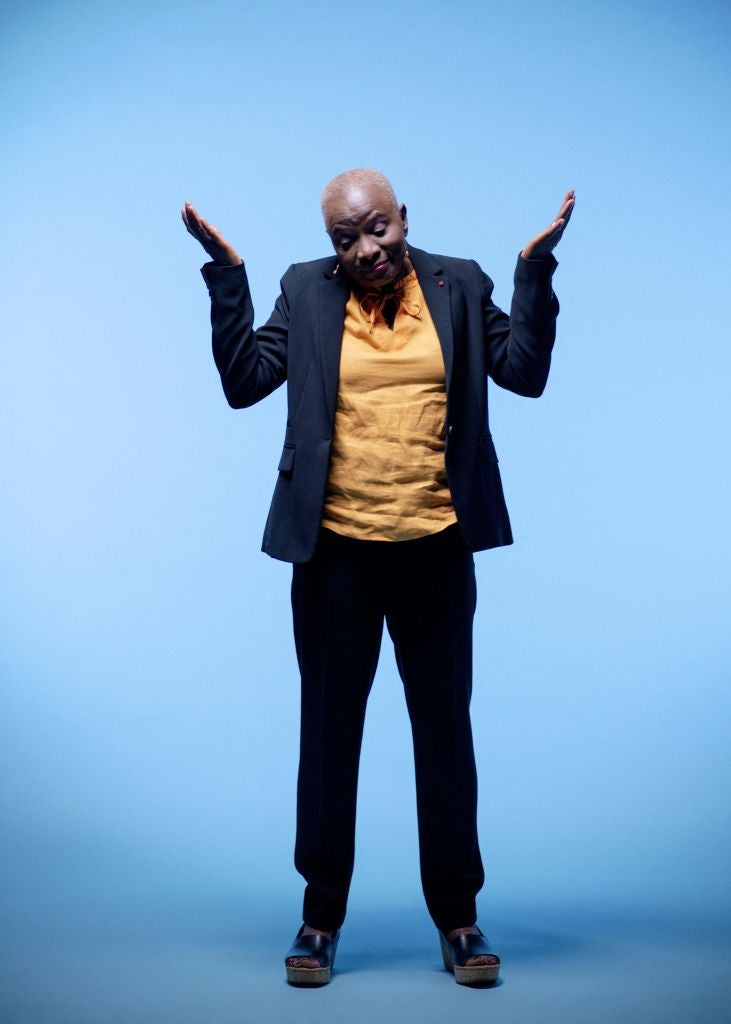Angélique Kidjo spent most of the past year in Paris, where she lived for almost 20 years from 1980 to the late ’90s. The multihyphenate Beninese-American music icon is usually based in New York City, the city she has chosen as her home base for the last two decades. It is there that she cemented an impressive catalog of music offerings — expansive in genre, innovate in sound — and pioneered a musical space that has earned her a reputation as Africa’s pop queen.
A monumental figure whose musical range encompasses everything from Afropop to Congolese rumba to jazz, Kidjo, 60, has won numerous accolades including four Grammy Awards. Her most recent was for Celia in 2020 in the Best Global Music Album category — which she has dominated with the most wins alongside South Africa’s Ladysmith Black Mambazo.
 Benin’s singer Angelique Kidjo poses during a photo session on Paris on June 12, 2021. (Photo by Olivier MORIN / AFP) (Photo by OLIVIER MORIN/AFP via Getty Images)
Benin’s singer Angelique Kidjo poses during a photo session on Paris on June 12, 2021. (Photo by Olivier MORIN / AFP) (Photo by OLIVIER MORIN/AFP via Getty Images)
Sitting on a chair in a dimly lit room in her Parisian home, Kidjo maintains a contagious confidence and curious spirit, oozing charm and geniality without a single hint of irony; rare. Whenever she speaks, she gives an impression of a down-to-earth mother, aunty, and friend detailing her life and opinions generously. Kidjo laughingly reports, for example, her desire to see someone else’s face other than her husband’s, whom she has spent the last year with, due to the ongoing pandemic.
“It’s only my husband and myself. I mean, after a while, I just am tired of talking to that guy,” she says, jokingly. “We’ve been married for 34 years. And I was looking at him the other day and said, “Man, I have to love you to talk to you for one year, only you.’”
When she left New York for Paris after her show in the prestigious Carnegie Hall venue was canceled last spring, Kidjo thought she’d return within three months, at most. Of course, that didn’t happen. Instead, she has had to experience the grief of losing loved ones, including her father-in-law and her longtime friend and former Fela Kuti drummer and band musical director, Toni Allen, as the pandemic raged on.
“It hit me really hard. Because I’m like, people that you love are gone. And you can’t even go to the funeral, there’s no way you can come to a closure, it is hard, it’s really hard,” she says, “So I turned to music.”
View this post on InstagramA post shared by Angelique Kidjo (@angeliquekidjo)
Coupled with bearing witness to the resurgence of Black Lives Matter after the murder of George Floyd in Minnesota, as well as #EndSars in Nigeria, Kidjo poured the loneliness of experiencing grief away from community into her latest album, Mother Nature. True to form, the album is an amalgamation of Afropop, Dancehall, R&B, and so much more as she employs the sounds and styles of many of today’s contemporary musicians from the continent as well as the diaspora. Mother Nature features established stars like Burna Boy, Mr. Eazi, and Yemi Alade, alongside rising genre-bending musicians like Sampa the Great, Blue Lab Beats, and Ghetto Boy.
In recalling how the numerous and different collaborations came about, Kidjo touched on how the different artists affectionately referred to her as “mom,” illustrating the endearment they feel towards her as an artist they were raised listening to. In return, she offered them not only her warmth but a respect between colleagues as she, too, marveled at their approach.
“As I was working in talking to all those artists, what is really striking is that they have a passion for the craft. They have a vision for their own work,” she says. “The hardest thing for an artist is to have an identity, a musical identity, and all of them, each one of them has their own musical identity.”
According to Kidjo, forming an identity as an African artist is always difficult but especially during this time. With the market for global audiences for popular African music having expanded with flourishing genres like Afropop or Afrobeats, she says it would be very easy to mimic each other. That so many artists have evaded that, is a testament to what she sees as a very bright musical future for the continent.
“I’ve been dying to see this because I’ve been telling young acts from Africa, ‘you can have role models but you’ve gotta be yourself,’” she says. “My duty here is to create that bond of transmission. And allow each one of us to be our own leaders in our right.”
In Mother Nature, Kidjo not only empowers her collaborators to occupy her musical space as equals, from songs like “Meant for Me” featuring Shungudzo and “Take it or Leave it” featuring Earthgang, she also showcases a continuous musical metamorphosis. In the album, Kidjo sings to drum beats and counts that operate as an ode to the traditional drumming sounds of generations past — widespread in West African music history — while utilizing rhythms and arrangements prevalent in Afrobeats, Hip-Hop, and Dancehall, among others.
While the past year personally and politically provided Kidjo with a source to work out her emotions musically, she also focused the meaning of the album on the need to take care of Mother Earth as the keeper of humanity.
“Right now, we are borrowing the future of our children and down the line, they’re gonna hold us accountable if we don’t do anything about it,” she says.
 Benin’s singer Angelique Kidjo poses during a photo session on Paris on June 12, 2021. (Photo by Olivier MORIN / AFP) (Photo by OLIVIER MORIN/AFP via Getty Images)
Benin’s singer Angelique Kidjo poses during a photo session on Paris on June 12, 2021. (Photo by Olivier MORIN / AFP) (Photo by OLIVIER MORIN/AFP via Getty Images)
For Kidjo, concern for climate change and preserving the planet is inescapably tied to preserving culture — African culture and history, specifically. Having always centered the perspectives of Africans and truly, all people of African-descent in her music, she is using Mother Nature as the vehicle to retell the themes, values, and stories that she believes must continuously be reiterated in each generation. Moreover, to the icon, this retelling must maintain its orality.
“Our history is not written, but yet it is more alive than any story that you can read in a book,” she says. “Everybody listens to stories…when you listen to it, you visualize it, it attracts your immediate imagination, and you can see yourself in that story.”
As Kidjo merges the stories of old and new, who she was and who she has becomes emerging from a tumultuous year — and alongside the musicians she sees as her successors — her desire for Mother Nature is clear: to showcase her ever transforming musical sensibilities, and to demonstrate that inasmuch as generations have grown up seeing themselves in her, she, too, has always seeing herself in them — in us — as well. She especially wants the youth on the continent and in the diaspora to feel seen in Mother Nature, and for the artists she works with to remember the role they play in this regard.
“Among all the young kids that are following all of us…there are many of them that have no outlet. How do we give them a sense of belonging if you don’t tell the story, through our music, about Mother Earth, about poverty, about police brutality, about dignity?” she says. “It’s our responsibility as artists in every form of music, movies, dance, theater, whatever.”
The post Angélique Kidjo Is Passing The Torch appeared first on Essence.


0 Commentaires